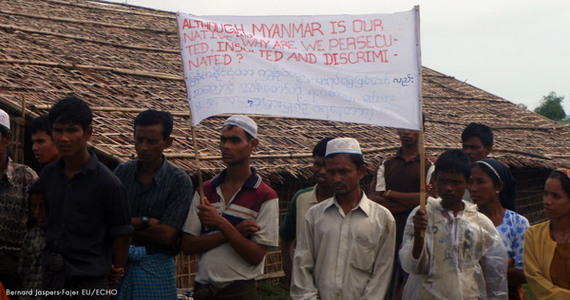Last week a new government took office in Burma while a chorus of business leaders, including the U.S. Chamber of Commerce, called for the lifting of U.S. economic sanctions on the Southeast Asian nation.
To do so would be a mistake. While the swearing in of a government run by the political party of Nobel Peace Laureate, Aung San Suu Kyi is welcome news, it is imperative that the U.S. keep the pressure up to protect minorities who remain under pressure and under siege.
The signals being sent by the Obama administration are not encouraging. And that is bad news for those who care about the plight of minorities like the 1.3 million Rohingya who continue to be denied basic rights as they try to survive under the harshest of conditions.
Over 100,000 Rohingya displaced by violence in 2012 remain in squalid camps facing severe restrictions on their freedom of movement and access to life-saving medical care and humanitarian aid. On a recent visit to the camps, one of the UN’s top humanitarian officials “expressed shock at seeing so many temporary shelters in a state of collapse and the appalling sanitation conditions.”
The million other Rohingya living outside the camps don’t have it all that much better, facing continued restrictions on their rights to marry, have children, and even to self-identify. Last May, thousands of Rohingya fleeing the conditions in Burma were trapped at sea and over 100 bodies, mostly Rohingya, were found in mass graves in the camps of human traffickers along the Thai and Malaysia border.
The Early Warning Project at the U.S. Holocaust Memorial Museum continues to list Burma at the top of the list of states likely to see mass killings. Independent human rights groups including United to End Genocide have warned about the high risk of genocide and Yale Law School’s Human Rights Clinic has found “strong evidence” that genocide may already be taking place.
Aung San Suu Kyi has said little about one of the most persecuted minorities on the planet, except that the plight of the Rohingya should not be “exaggerated.” Her political party spokesperson told reporters after its election that the conditions facing the Rohingya “would not be a priority” of the new government and suggested that the new government needed to work with neighboring Bangladesh on the question of where the Rohingya belonged. This fueled the narrative of the former ruling party that the Rohingya are illegal immigrants and should have few rights, despite the fact that most of the Rohingya have lived in Burma for generations.
Aung Ko, who was just appointed Minister of Religious Affairs in the new government, continued this by telling reporters last week that the Rohingya and all Muslims in Burma are but “associate citizens.”
A recent congressionally mandated report by the State Department, the same report that led to the determination that the Islamic State is committing genocide, ignored the question of atrocities taking place against the Rohingya and grossly understated their plight by concluding only that the Rohingya face “persecution” and “discrimination.” There was no mention of the Rohingya at the U.S.-ASEAN Summit that President Obama hosted in California in February, but Burma’s Vice President did use the occasion to urge lifting of U.S. sanctions.
Advocates for lifting U.S. sanctions point to news that 25,000 Rohingya have returned to their homes in the past year. They fail to note, however, the latest report of the UN Special Rapporteur for Human Rights in the country that finds that, “only a small majority relocated voluntarily.” They also ignore the brutal reality that even those Rohingya who were never displaced remain without citizenship and basic human rights. As the Special Rapporteur has stated, “There are more than a million Rohingya Muslims in Myanmar deprived of some of their most fundamental rights. This is a million too many.”
The consequences of these conditions are real. The UN Special Rapporteur continues to report on “preventable deaths due to lack of access to emergency medical treatment.” The expulsion of Doctors Without Borders in February 2015 led to an estimated 150 deaths in the first two weeks alone. Though the group has since been allowed to return, it is at a significantly reduced level with even more restrictions.
As long as the Rohingya continue to face systemic persecution, apartheid-like conditions, denial of basic human rights, and a high risk of atrocities, the United States must be clear that failure to address these conditions will negatively affect U.S.-Burma bilateral relations. If the new government of Burma fails to prioritize protection of the Rohingya and prevention of the world’s worse crimes, then the United States must do so. Renewing U.S. sanctions for another year on Burma is an important start.
President Obama clearly considers the significant reforms and opening of Burma to be an important part of his legacy, but glossing over the risk of genocide faced by the Rohingya may just bolster a legacy of willful ignorance of human rights abuses and their tragic consequences.
